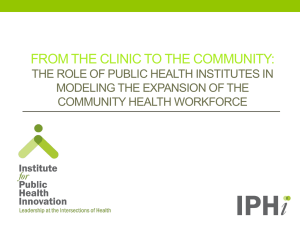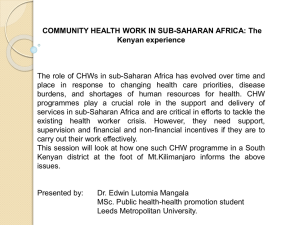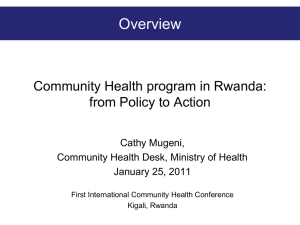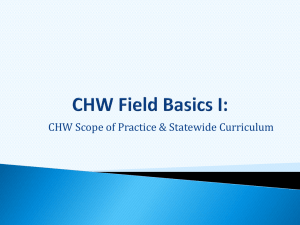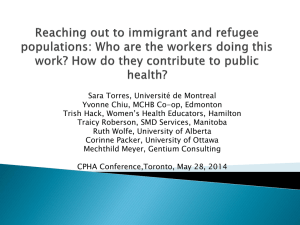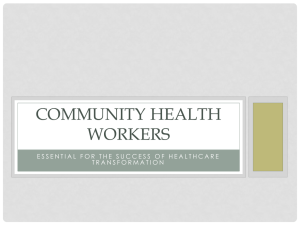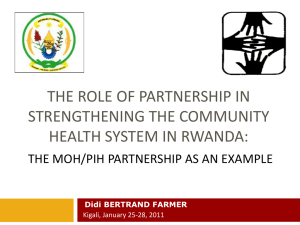Word
advertisement
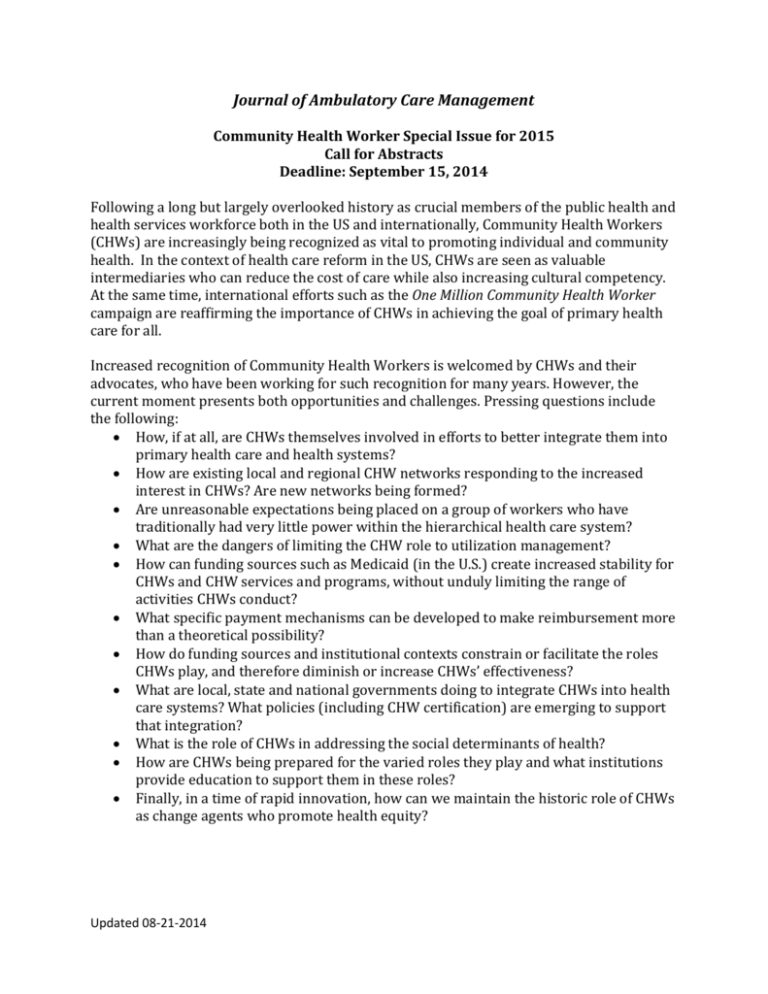
Journal of Ambulatory Care Management Community Health Worker Special Issue for 2015 Call for Abstracts Deadline: September 15, 2014 Following a long but largely overlooked history as crucial members of the public health and health services workforce both in the US and internationally, Community Health Workers (CHWs) are increasingly being recognized as vital to promoting individual and community health. In the context of health care reform in the US, CHWs are seen as valuable intermediaries who can reduce the cost of care while also increasing cultural competency. At the same time, international efforts such as the One Million Community Health Worker campaign are reaffirming the importance of CHWs in achieving the goal of primary health care for all. Increased recognition of Community Health Workers is welcomed by CHWs and their advocates, who have been working for such recognition for many years. However, the current moment presents both opportunities and challenges. Pressing questions include the following: How, if at all, are CHWs themselves involved in efforts to better integrate them into primary health care and health systems? How are existing local and regional CHW networks responding to the increased interest in CHWs? Are new networks being formed? Are unreasonable expectations being placed on a group of workers who have traditionally had very little power within the hierarchical health care system? What are the dangers of limiting the CHW role to utilization management? How can funding sources such as Medicaid (in the U.S.) create increased stability for CHWs and CHW services and programs, without unduly limiting the range of activities CHWs conduct? What specific payment mechanisms can be developed to make reimbursement more than a theoretical possibility? How do funding sources and institutional contexts constrain or facilitate the roles CHWs play, and therefore diminish or increase CHWs’ effectiveness? What are local, state and national governments doing to integrate CHWs into health care systems? What policies (including CHW certification) are emerging to support that integration? What is the role of CHWs in addressing the social determinants of health? How are CHWs being prepared for the varied roles they play and what institutions provide education to support them in these roles? Finally, in a time of rapid innovation, how can we maintain the historic role of CHWs as change agents who promote health equity? Updated 08-21-2014 With these questions in mind, the Journal of Ambulatory Care Management issues this call for abstracts for a third special edition on Community Health Workers. (The first pair of special CHW issues (Vol. 34 - Issue 3 & 4) were published in 2011 and can be accessed at: http://journals.lww.com/ambulatorycaremanagement/pages/issuelist.aspx?year=2011 Special CHW Issue for 2015 – Community Health Workers: Perils and Promise of Global and National Recognition The Journal of Ambulatory Care Management is a peer-reviewed journal that provides timely, applied information on the most important developments and issues in ambulatory care management. General guidelines for submission to the journal are available at: http://www.ambulatorycaremanagement.com/pt/re/jacm/authorinfo.htm Call for Submissions The Journal invites papers describing original research, including case studies of CHW practice and policy. Authors should include clear, translatable insights from successes and failures. Paper are sought on the following topics, among others: 1) Development of payment mechanisms to use Medicaid (in the U.S.) and other funding sources to support CHW programs and services; 2) CHW training programs that use liberatory pedagogy, prepare CHWs to play a wide range of roles across the socio-ecological model, and/or are culturally specific; 3) Efforts to sustain the historic role(s) of CHWs while better integrating them into primary care and health systems; 4) Cost effectiveness of CHW programs and services (including both social and economic costs); 5) The influence of funding sources and institutional contexts on CHW effectiveness; 6) Workforce justice and pay equity for CHWs; and 7) Efforts to keep CHWs in the forefront of policy and program development and to promote CHW self-determination. NOTE: Articles that include CHWs as authors will receive special consideration. Please note inclusion with Abstract submission. For articles discussing community health worker interventions, authors should describe intervention elements in their full articles, including: the type, amount, and methodology of CHW education; roles played by CHWs; CHW service/program financing mechanisms; and main outcome measures. As possible, reference to these elements should be briefly made in abstracts. If their abstracts are accepted, authors will be asked to complete a summary table about the intervention with the information listed above for inclusion in on-line supplemental materials. Special Issue Submission and Additional Information The special issue will consist of introductory context pieces, research articles, and “CHW Voices” composed of short invited pieces by Community Health Workers from around the world. (If you are a CHW or know a CHW interested in sharing a “Voices” piece, please Updated 08-21-2014 contact the editorial team noted below on or by the abstract deadline of 9-15-14). In addition, we invite commentaries of 1,500 words or less from CHWs, CHW allies, supervisors, program managers, and others. These commentaries should address issues of current importance to the field. Authors should submit an email with a structured abstract attachment (350-400 words including introduction, methods, results, conclusions) to the three editors (below), with the subject title: “Abs_CHW_Spec_Issue_2015” on/by September 15, 2014 by 11:59 pm ET. The Editors will contact authors upon review of the abstract. Full manuscripts will be solicited from a selection of authors who have submitted abstracts. All abstracts and manuscripts will be subject to the rigorous JACM peer-review process. Abstracts and manuscripts that are considered within scope and meet quality expectations will be reviewed by a minimum of two experts for scientific merit. The deadline for submission of invited, completed manuscripts is December 31, 2014. The publication of the special edition is planned for summer, 2015. Final manuscripts should total 5,000 words or less including tables, figures, appendices, and references; note that the final published abstract must be 100 words or less. The Journal of Ambulatory Care Management follows the style and format of Publication Manual of the American Psychological Association, 6th ed. Washington, DC: APA, 2010. Full style and formatting guidelines are accessible at http://www.editorialmanager.com/jacm/ For authors whose native language is not English, assistance of a native English speaker is highly recommended prior to submission. Photographs may result in a reduction of available words for a given article. All photos should be .jpg files. Figure reprint permissions must be provided for all photos not created by the authors or considered public domain. Individuals pictured in photos must provide a signed consent for publication. Consult the publisher’s website for best practices regarding image submission: http://journals.lww.com/ambulatorycaremanagement/pages/informationforauthors.aspx For more information or to answer any questions, authors should contact guest editors: E. Lee Rosenthal, Lee.Rosenthal@uth.tmc.edu Noelle Wiggins, ninanoelia@msn.com or Journal editor, Norbert Goldfield nigoldfield@mmm.com Updated 08-21-2014
